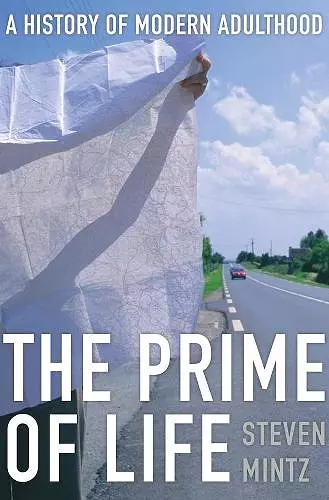The Prime of Life
A History of Modern Adulthood
Format:Hardback
Publisher:Harvard University Press
Published:30th Apr '15
Currently unavailable, and unfortunately no date known when it will be back

Adulthood today is undergoing profound transformations. Men and women wait until their thirties to marry, have children, and establish full-time careers, occupying a prolonged period in which they are no longer adolescents but still lack the traditional emblems of adult identity. People at midlife struggle to sustain relationships with friends and partners, to find employment and fulfilling careers, to raise their children successfully, and to resist the aging process.
The Prime of Life puts today’s challenges into new perspective by exploring how past generations navigated the passage to maturity, achieved intimacy and connection, raised children, sought meaning in work, and responded to loss. Coming of age has never been easy or predictable, Steven Mintz shows, and the process has always been shaped by gender and class. But whereas adulthood once meant culturally-prescribed roles and relationships, the social and economic convulsions of the last sixty years have transformed it fundamentally, tearing up these shared scripts and leaving adults to fashion meaning and coherence in an increasingly individualistic culture.
Mintz reconstructs the emotional interior of a life stage too often relegated to self-help books and domestic melodramas. Emphasizing adulthood’s joys and fulfillments as well as its frustrations and regrets, he shows how cultural and historical circumstances have consistently reshaped what it means to be a grown up in contemporary society. The Prime of Life urges us to confront adulthood’s realities with candor and determination and to value and embrace the responsibility, sensible judgment, wisdom, and compassionate understanding it can bring.
We live in an age of generational turmoil. Baby-boom parents are accused of clinging on to jobs and houses which they should be freeing up for their children. Twentysomethings who can’t afford to leave home and can’t get jobs are attacked as aimless and immature. Both sides of the generational divide should take comfort from this timely, thoughtful work by Steven Mintz…Mintz argues for a new understanding of adulthood…It is a great book, and a triumph of historical writing; it shows that the past really can explain the present. -- Jane Ridley * The Spectator *
[Mintz] offers some comforting news. Going back centuries in this country, ‘adults’ never particularly had their acts together… [He shows] that the 1950s model of family life, with its emphasis on early marriage and childbearing as markers of adulthood, is anything but representative of traditional values… His message—that there are many ways to wear the mantle of responsible adulthood and that the 1950s model is a mere blip on history’s radar—is deeply necessary and long overdue. -- Meghan Daum * New York Times Book Review *
Mintz uses history to illustrate both the similarities and differences between adulthood in 2015 and adulthood in other times, so that readers can put their lives into perspective…Mintz is a good storyteller and his examples, particularly from centuries past are engaging. Ultimately, Mintz provides a very readable, and very interesting, history of an all too often overlooked subject. -- Catherine Ramsdell * PopMatters *
This original and comprehensive book interestingly sets the far-reaching change in contemporary adulthood in historical perspective. -- E. Stina Lyon * Times Higher Education *
Coming of age, argues historian Steven Mintz, is not what it used to be. Characterizing adulthood as a ‘historical black hole,’ Mintz sets out to trace the concept’s trajectory from the nineteenth century to its 1950s apex, and its disintegration in our individualistic times. He looks at shifts in intimacy, marriage, parenthood and work, noting that some 80% of today’s U.S. citizens in their late twenties have yet to tick off all the traditional indicators of adulthood, such as leaving home. Yet we need to dig deeper to redefine adulthood, he avers—not least, by reinstating qualities such as judgement to the definition. -- Barbara Kiser * Nature *
Describing the cultural, economic, and social changes from the Colonial era to today’s world with a wealth of information and attention to class, gender, and ethnicity, Mintz argues that neither religious nor secular middle-class values are adequate responses to the new generation’s problems. -- N. Zmora * Choice *
A thoughtful and strangely encouraging tour of an often difficult life stage. * Kirkus Reviews *
Historian Mintz approaches a big subject--American adulthood--in a big way; by drawing on 400 years of social and economic history, philosophy, psychology, law, religion, literature, art, and even cinema and television…He presents a thoughtful and thorough guide through the life stages for all readers wishing to embark on these big voyages. -- Janet Ingraham Dwyer * Library Journal *
In the 1950s, most men had met all of society’s markers for adulthood by their mid-20s—and most women would never fully meet them, whatever their age. In this engagingly written and thought-provoking book, Mintz explores the fascinating history of American definitions of adulthood and shows how new economic, cultural, and gender relationships have expanded and complicated those definitions in recent years. -- Stephanie Coontz, author of A Strange Stirring: The Feminine Mystique and American Women at the Dawn of the 1960s
The Prime of Life is a compelling story of just how much the meaning and process of attaining adulthood has changed throughout the history of the United States. Mintz does a masterful job of narration and interpretation, reminding readers why he is the preeminent historian of the life course. -- Frank F. Furstenberg, author of Destinies of the Disadvantaged: The Politics of Teenage Childbearing
- Nominated for Pulitzer Prizes 2016
- Nominated for Merle Curti Award 2016
- Nominated for Zócalo Public Square Book Prize 2016
- Nominated for New-York Historical Society American History Book Prize 2015
- Nominated for Francis Parkman Prize 2016
ISBN: 9780674047679
Dimensions: unknown
Weight: unknown
432 pages